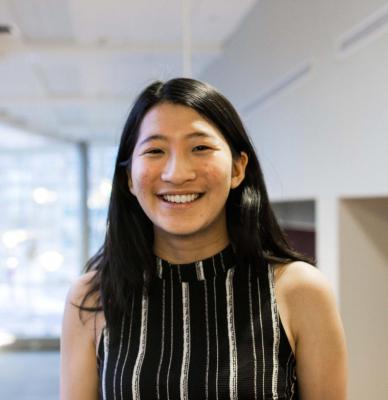
Angel Nugroho, a rising junior at Cornell University studying information science, is a Coding it Forward Civic Digital Fellow at NIH this year. Angel is teleworking this summer from Charlotte, N.C., and working with Eric Sid, M.D., in the Office of Rare Diseases Research at the National Center for Advancing Translational Sciences (NCATS).
“I’m working with the GARD network database this summer,” Nugroho said. “We wanted to use network analysis to see if we can create a diagnostic resource out of the database to help the GARD website or researcher. If someone puts in a symptom, then we’ll be able to give them an output based on the connections in the database.”
GARD is the Genetic and Rare Diseases Information Center, an information center designed to provide comprehensive information about rare and genetic diseases to patients, their families, health care providers, researchers and the public.
“One of the biggest challenges for a rare disease is that it is often hard to get attention and funding for research and development of a new treatment with a small patient population and can partly explain why an estimated 95% of rare diseases lack a treatment,” Sid explained.
“With Angel’s project, we’re taking lessons from some of the more well-known, more well-researched, and perhaps even more prevalent rare diseases and applying them to those diseases that have less information or a smaller population to try to create tools that can impact all the groups together.”
Supporting this project gives Nugroho a unique look at how data science intersects with biomedicine and is inspiring her as she works toward a career that integrates data science and archeology.
“I’m hoping to do something related to data science within archeology either by analyzing or creating a database for artifacts or doing biological analysis with the human remains at sites,” Nugroho shared. “I’m learning that there aren’t a lot of overlaps with data techniques and this field yet. I’m hoping I can come in and do something to change that.”
While Nugroho is working to improve tools for those touched by rare diseases, she’s also experienced the same adjustment that much of the NIH workforce has been dealing with since mid-March due to COVID-19– working from home. The Coding it Forward fellowship is traditionally an in-person experience with fellows traveling from around the country to spend 10 weeks in the Washington, D.C., area.
“Having the opportunity to do the fellowship even though it’s remote – I’m so thankful for it,” Nugroho said. “I have friends from college whose internships were canceled or shortened, and they can’t do a project like this one in such a short amount of time.”
When these student fellows aren’t working, they typically spend much of their free time getting to know each other and experiencing life inside the Beltway together. With the fellowship fully remote this summer, the fellows have adapted the same as many NIH teams: virtual get-togethers via Zoom. At a recent virtual gathering, Nugroho shared her party trick that she learned in middle school.
“I can make balloon animals,” Nugroho said with a smile as she reached over her computer to show off a pink balloon pig. “For me, it’s my way of doing something that doesn’t involve a screen. I feel constantly surrounded by tech, so I love learning about other areas too – whether that’s hobbies like this or biomedicine.”
The Office of Data Science Strategy at NIH works with institutes and centers like NCATS and with Coding it Forward to bring fresh perspectives to tackle computational challenges facing the biomedical research workforce each summer. ODSS will feature fellows and mentors from the 2020 cohort throughout the summer. Meet Angel's mentor, Dr. Eric Sid.


